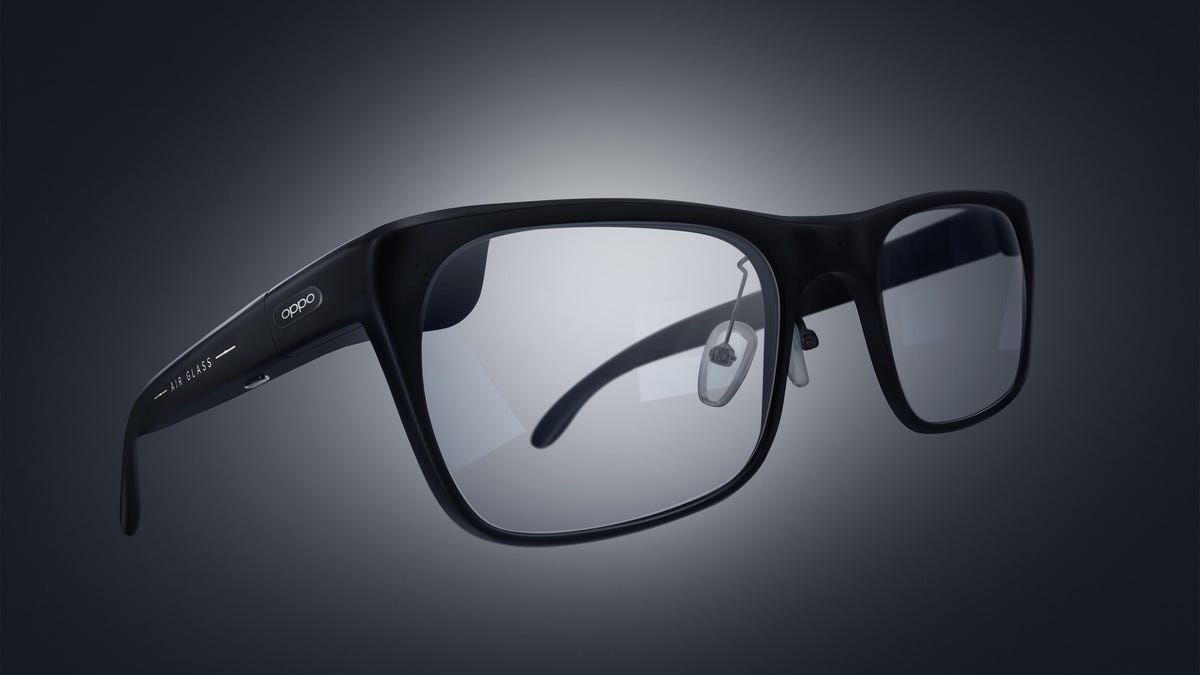Oppo's Air Glass 3 Smart Glasses Have an AI Assistant and Better Visuals
Oppo's new prototype smart glasses are the latest gadget to get a dose of AI following the success of ChatGPT.

Oppo's Air Glass 3 prototype has a new display that can reach over 1,000 nits at peak brightness.
Oppo is emphasizing the "smart" aspect of smart glasses with its latest prototype, the Air Glass 3, which the Chinese tech giant announced Monday at Mobile World Congress 2024.
The new glasses can be used to interact with Oppo's AI assistant, signaling yet another effort by a major tech company to integrate generative AI into more gadgets following the success of ChatGPT. The Air Glass 3 prototype is compatible with Oppo phones running the company's ColorOS 13 operating system and later, meaning it'll probably be exclusive to the company's own phones. Oppo didn't mention pricing or a potential release date for the Air Glass 3 in its press release, which is typical of gadgets that are in the prototype stage.
Read more: Microsoft Is Using AI to Stop Phone Scammers From Tricking You
The glasses can access a voice assistant that's based on Oppo's AndesGPT large language model, which is essentially the company's answer to ChatGPT. But the eyewear will need to be connected to a smartphone app in order for it to work, likely because the processing power is too demanding to be executed on a lightweight pair of glasses. Users would be able to use the voice assistant to ask questions and perform searches, although Oppo notes that the AI helper is only available in China.
Following the rapid rise of OpenAI's ChatGPT, generative AI has begun to show up in everything from productivity apps to search engines to smartphone software. Oppo is one of several companies -- along with TCL and Meta -- that believe smart glasses are the next place users will want to engage with AI-powered helpers. Mixed reality has been in the spotlight thanks to the launch of Apple's Vision Pro headset in early 2024.
Like the company's previous smart glasses, the Air Glass 3 looks just like a pair of spectacles, according to images provided by Oppo. But the company says it's developed a new resin waveguide that it claims can reduce the so-called "rainbow effect" that can occur when light refracts as it passes through.
Waveguides are the part of the smart glasses that relays virtual images to the eye, as smart glasses maker Vuzix explains. If the glasses live up to Oppo's claims, they should offer improved color and clarity. The glasses can also reach over 1,000 nits at peak brightness, Oppo says, which is almost as bright as some smartphone displays.
Oppo's Air Glass 3 prototype weighs 50 grams, making it similar to a pair of standard glasses, although on the heavier side. According to glasses retailer Glasses.com, the majority of glasses weigh between 25 to 50 grams, with lightweight models weighing as low as 6 grams.
Oppo is also touting the glasses' audio quality, saying it uses a technique known as reverse sound field technology to prevent sound leakage in order to keep calls private. There are also four microphones embedded in the glasses -- which Oppo says is a first -- for capturing the user's voice more clearly during phone calls.
There are touch sensors along the side of the glasses for navigation, and Oppo says you'll be able to use the glasses for tasks like viewing photos, making calls and playing music. New features will be added in the future, such as viewing health information and language translation.
With the Air Glass 3, Oppo is betting big on two major technologies gaining a lot of buzz in the tech world right now: generative AI and smart glasses. Like many of its competitors, it'll have to prove that high-tech glasses are useful enough to earn their place on your face. And judging by the Air Glass 3, it sees AI as being part of that.
Editors' note: CNET is using an AI engine to help create some stories. For more, see this post.

